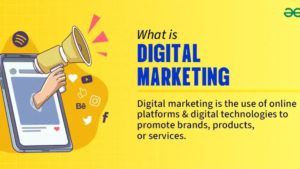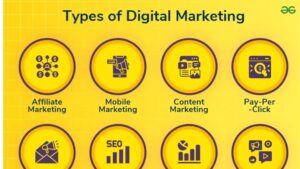What Is Digital Marketing? Types and Examples
Nowadays, everyone is connected to the internet through their mobile phones and laptop devices. Understanding why digital marketing is essential for businesses aiming to succeed online through modern marketing and for individuals looking to make a career in digital marketing. Digital marketing, or online marketing, strategically promotes brands, products, or services using various digital channels and technologies. With the rise of the internet and mobile devices, businesses now have huge opportunities to reach a global audience.
Whether through innovative search engine marketing (SEM) strategies or advanced digital marketing software, companies can connect with potential customers like never before. Utilizing search engine optimization (SEO), content marketing, social media advertising, and email marketing allows businesses to effectively reach and engage their target audience, driving growth and achieving marketing objectives.

Understanding Digital Marketing: A Complete Guide
What is digital marketing? A complete guide
Digital marketing, also known as online marketing, is the practice of promoting brands, products, or services through digital channels and technologies. This approach leverages the internet and various digital platforms to connect with potential customers, enhance brand visibility, and drive business growth. Businesses often engage in digital marketing services or hire a digital marketing agency to optimize their online presence.
For example, when you see an advertisement while watching a YouTube video, that is digital marketing in action. These ads are a form of video marketing, a powerful strategy used by businesses to reach potential customers through engaging and targeted video content. Such advertisements can be tailored to the viewer’s interests and behavior, making them a highly effective component of a comprehensive digital marketing strategy.
Types of Digital Marketing
Digital marketing encompasses a wide range of strategies and techniques aimed at promoting products or services through digital channels. Here are the key types of digital marketing:
1. Search Engine Optimization (SEO)
SEO involves optimizing a website to improve its visibility in search engine results pages (SERPs). The goal is to attract organic traffic by using relevant keywords, improving site structure, and earning backlinks. Effective SEO can enhance online visibility and drive long-term traffic.
2. Content Marketing
Content marketing focuses on creating and distributing valuable, relevant content to attract and engage a target audience. This includes blog posts, articles, videos, infographics, and eBooks. The objective is to provide useful information that encourages customer loyalty and drives conversions.
3. Social Media Marketing
Social media marketing involves using platforms like Facebook, Instagram, Twitter, LinkedIn, and TikTok to promote products and engage with customers. This type of marketing can include organic content, paid advertising, and influencer partnerships to reach a broader audience and build brand awareness.
4. Pay-Per-Click (PPC) Advertising
PPC advertising is a model where advertisers pay a fee each time their ad is clicked. Common platforms for PPC include Google Ads, Bing Ads, and social media ads (e.g., Facebook Ads). PPC allows businesses to reach potential customers quickly and control their advertising spend.
5. Email Marketing
Email marketing involves sending targeted emails to a subscriber list to promote products, share news, or provide valuable content. Effective email marketing campaigns can nurture leads, retain customers, and drive sales. Tools like Mailchimp and Constant Contact are popular for managing email campaigns.
6. Affiliate Marketing
Affiliate marketing is a performance-based strategy where businesses reward affiliates (partners) for driving traffic or sales through their referral links. Affiliates use their platforms, such as blogs or social media, to promote the business’s products. Amazon Associates is a well-known affiliate program.
7. Influencer Marketing
Influencer marketing leverages individuals with a large following on social media or other platforms to promote products or services. Influencers can provide authentic endorsements and reach niche audiences effectively. Collaborations can range from sponsored posts to product reviews.
8. Video Marketing
Video marketing uses video content to promote products, educate customers, and increase engagement. Platforms like YouTube, Vimeo, and social media channels are popular for video marketing. Examples include product demos, tutorials, and customer testimonials.
9. Marketing Automation
Marketing automation involves using software to automate marketing tasks such as email campaigns, social media posts, and lead nurturing. Tools like HubSpot, Marketo, and Pardot help streamline these processes, allowing for more personalized and efficient marketing efforts.
10. Search Engine Marketing (SEM)
SEM encompasses various tactics used to improve a website’s visibility in search engine results, including both SEO and paid search advertising. Google Ads is a common platform used for SEM to bid on keywords and display ads in search results.

Types of Digital Marketing
Key Elements of Digital Marketing
Search Engine Optimization (SEO)
SEO, or Search Engine Optimization, is the process of optimizing your website and content to rank higher on search engine results pages (SERPs). It involves keyword research, on-page optimization, and building high-quality backlinks. For example, Moz, a leading SEO software company, uses SEO services to improve their visibility for high-volume keywords like “SEO tools” and “search engine optimization strategies.”
Content Marketing
Content marketing focuses on creating and distributing valuable, relevant content to attract and engage a target audience. This includes blog posts, videos, infographics, and ebooks. HubSpot, a prominent digital marketing agency, utilizes a robust content marketing strategy by offering free resources such as blogs, ebooks, and webinars to drive traffic and generate leads for their marketing automation software.
Social Media Marketing
Social media marketing involves using platforms like Facebook, Instagram, Twitter, and LinkedIn to promote products, engage with customers, and build brand awareness. For example, Nike effectively uses social media advertising on Instagram and Twitter to showcase their products, engage with followers, and drive online sales, often targeting their audience with visually compelling ads.
Email Marketing
Email marketing is a powerful tool for nurturing leads and maintaining customer relationships. It involves sending targeted emails to a subscriber list to promote products, share news, and provide valuable content. For instance, Mailchimp offers comprehensive email marketing services and email marketing software that businesses use to create, send, and analyze their email campaigns, helping them reach their audience effectively.
Pay-Per-Click (PPC) Advertising
PPC, or Pay-Per-Click advertising, is a model where advertisers pay a fee each time their ad is clicked. Google Ads is the most popular PPC platform. An example is Amazon, which uses PPC management to run targeted ads on Google, driving traffic to their product pages and increasing sales by bidding on high-volume keywords like “buy electronics online.”
Affiliate Marketing
Affiliate marketing involves partnering with other businesses or individuals to promote your products or services. Affiliates earn a commission for each sale made through their referral links. An example is Bluehost, which offers an affiliate program where bloggers and website owners earn commissions by promoting Bluehost’s web hosting services on their sites.
Influencer Marketing
Influencer marketing leverages individuals with large social media followings to promote your brand. This can include product placements, reviews, and endorsements. For example, the beauty brand Glossier uses influencer marketing platforms to collaborate with beauty influencers on Instagram, driving brand awareness and sales through authentic endorsements.
Video Marketing
Video marketing involves creating and sharing video content to engage and educate your audience. Platforms like YouTube and social media channels are commonly used. For example, Dollar Shave Club‘s viral video marketing campaign on YouTube effectively promoted their subscription service, generating millions of views and significantly boosting their brand recognition.
Marketing Automation
Marketing automation uses software to automate marketing tasks and processes, enhancing efficiency and relevance. HubSpot’s marketing automation software is widely used by businesses to automate email marketing, social media posting, and lead nurturing, making their marketing efforts more efficient and personalized.
Marketing Analytics
Marketing analytics tools are essential for measuring and analyzing the performance of digital marketing campaigns. These tools help businesses understand their audience, track conversions, and make data-driven decisions. Google Analytics is a prime example, offering in-depth insights into website traffic and user behavior, helping marketers refine their strategies.
Consulting Services
Digital marketing consultants provide expert advice and strategies to help businesses improve their online presence. Neil Patel, a well-known digital marketing consultant, offers consulting services that help businesses enhance their SEO, content marketing, and overall digital strategy to achieve better results.
Digital Marketing Tools
Digital marketing tools are essential for optimizing online marketing efforts. They help manage campaigns, analyze performance, and engage with audiences. These tools streamline marketing workflows, provide valuable insights, and help achieve better results in digital marketing campaigns.
1. Google Analytics
Tracks website traffic, user behavior, and campaign performance.
2. SEMrush
Offers keyword research, competitor analysis, and site audits.
3. Hootsuite
Manages multiple social media accounts, schedules posts, and tracks engagement.
4. Mailchimp
Handles email marketing with features like templates, segmentation, and automation.
5. Ahrefs
Focuses on backlink analysis and competitor research.
6. Canva
Provides graphic design tools for creating social media graphics and marketing materials.
7. HubSpot
Combines marketing, sales, and CRM tools for automation and lead management.
8. Buffer
Schedules social media posts and tracks performance.
Benefits of Digital Marketing
Cost-Effective
Digital marketing is often more affordable than traditional marketing methods, making it accessible for businesses of all sizes. For example, a small local coffee shop can use social media marketing to reach a wider audience without the high costs associated with print or TV advertising.
Measurable Results
Digital marketing provides clear metrics that allow you to track the performance of your campaigns. Tools like Google Analytics and social media insights help you analyze data and make informed decisions to optimize your strategies. For instance, an e-commerce store can track the number of clicks, conversions, and sales generated from an email marketing campaign.







